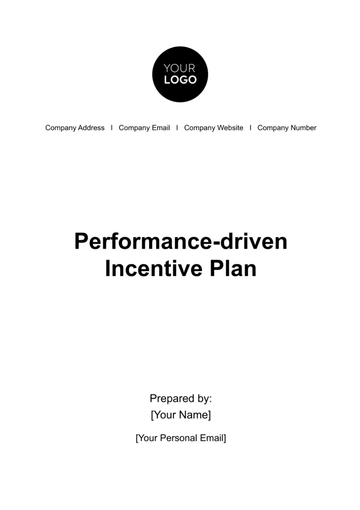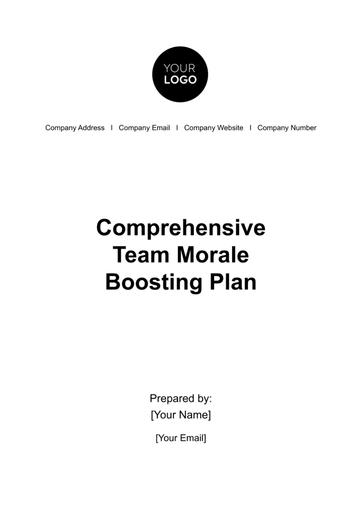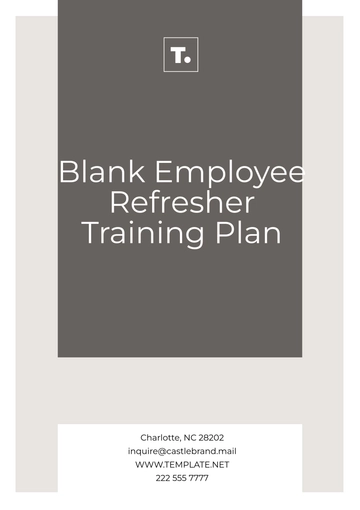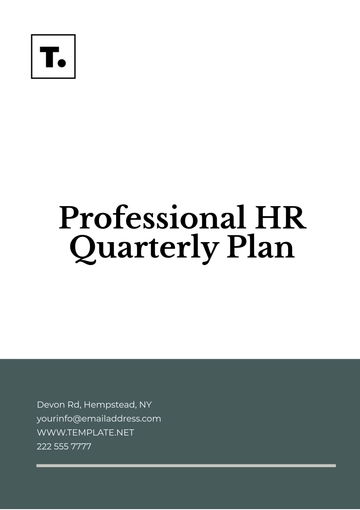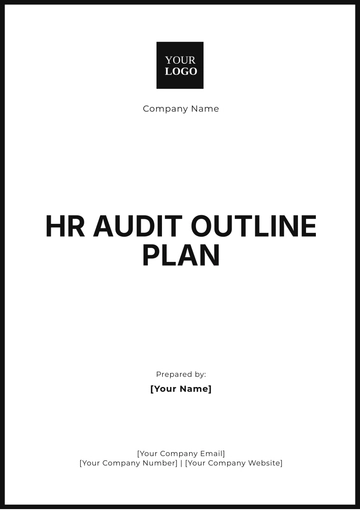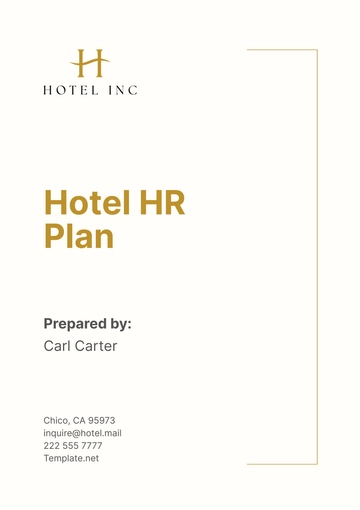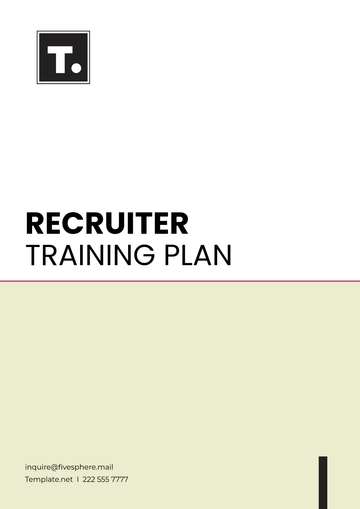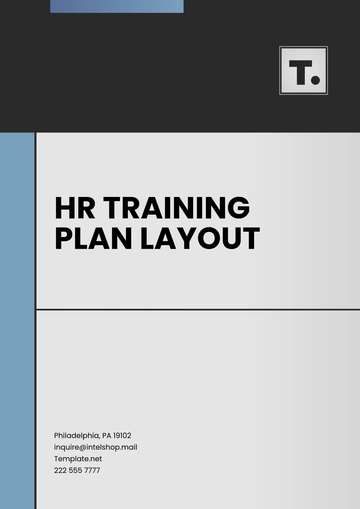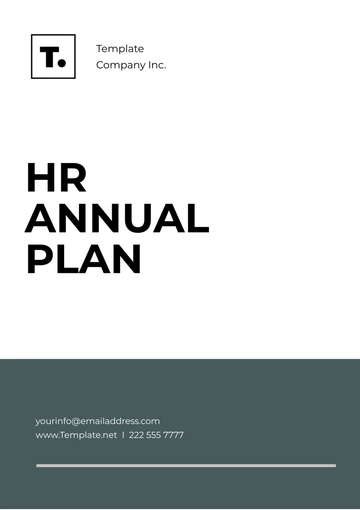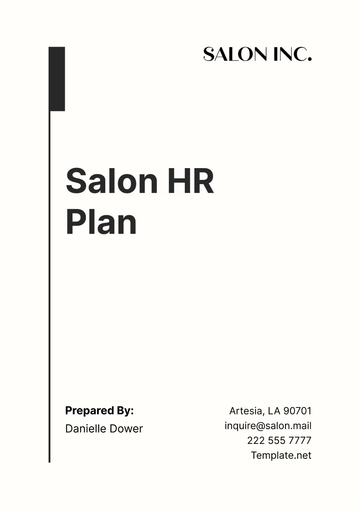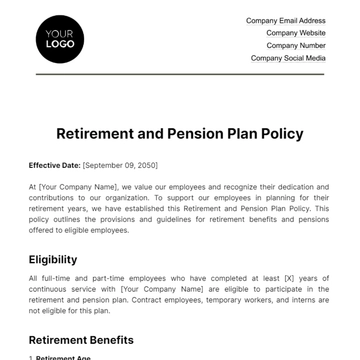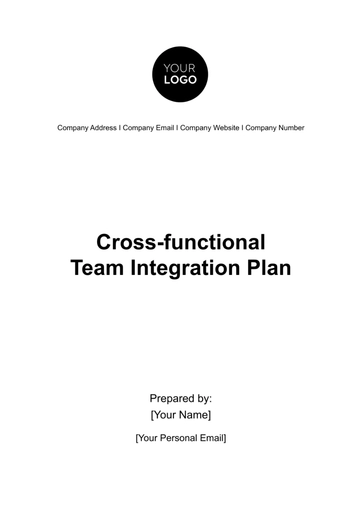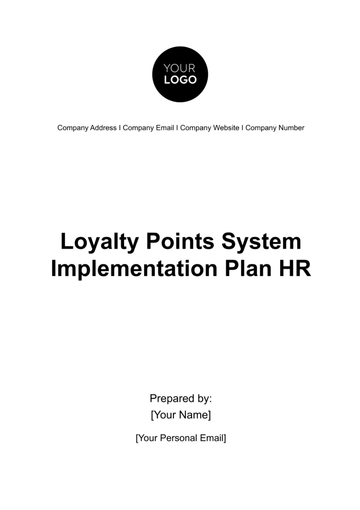Free HR Training Plan Layout
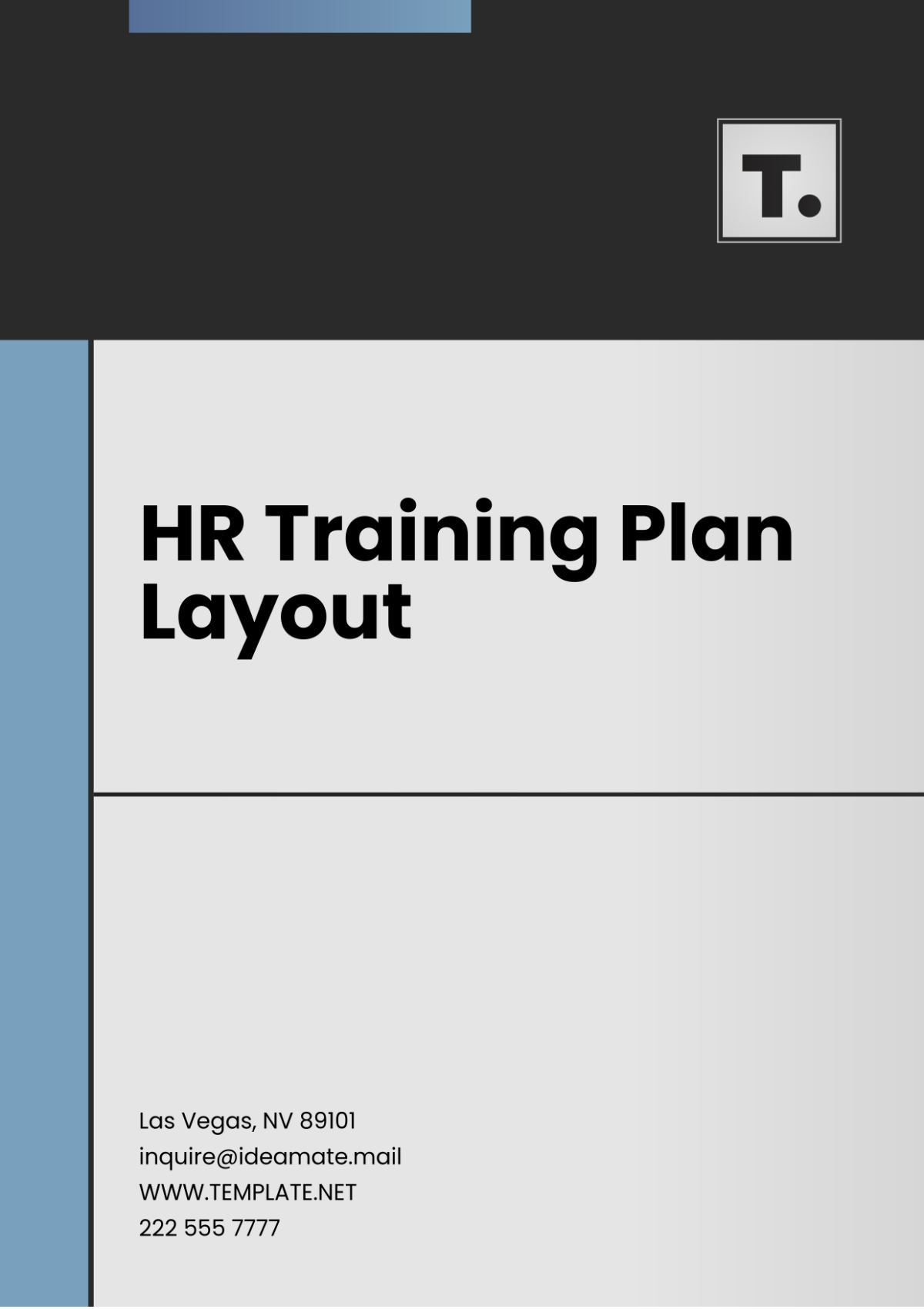
Prepared by: [Your Name]
I. Introduction
Summarize the purpose and objectives of the HR Training Plan, emphasizing its role in enhancing workforce capabilities and aligning with organizational goals.
Example:
The Skills Development HR Training Plan aims to enhance the competencies and capabilities of employees within [YOUR COMPANY NAME]. By investing in the development of skills, we ensure that our workforce remains competitive and equipped to meet the evolving needs of our industry.
II. Training Needs Assessment
Outline the process and tools you will use to identify skills gaps within your organization.
Example:
To initiate this transformative journey, we will conduct a comprehensive Training Needs Assessment. Through a blend of surveys, interviews, and performance evaluations, we will meticulously identify the existing skills gaps and pinpoint the precise training requisites across diverse departments and job roles within [YOUR COMPANY NAME].
III. Training Objectives
Specify the key goals for the training plan and how they address organizational needs.
Example:
Precision Skill Identification: We endeavor to identify the core skills and competencies requisite for each distinct job role within our organization.
Customized Training Programs: Armed with insights from our assessment, we will tailor bespoke training programs meticulously crafted to address the identified skill lacunae.
Fostering Continuous Learning: We are committed to nurturing a culture of perpetual learning and professional development, ensuring our workforce remains at the vanguard of industry trends.
Boosting Engagement and Retention: By investing in the growth and development of our employees, we not only enhance engagement but also bolster retention rates, fostering a loyal and motivated workforce.
IV. Training Programs
Define specific training programs, their objectives, and key elements.
Example:
1. Onboarding and Orientation:
We will orchestrate a comprehensive onboarding program meticulously designed to immerse new hires in the ethos, culture, and operational frameworks of [YOUR COMPANY NAME].
Additionally, job-specific training modules will be instituted to arm fresh recruits with the requisite skills and knowledge indispensable for their respective roles within the organization.
2. Technical Skills Development:
[YOUR COMPANY NAME]'s training academy will serve as the cornerstone of our technical skills development initiatives, offering a myriad of specialized workshops and seminars tailored to address industry-specific exigencies.
Complementing these endeavors, our employees will have access to a trove of online courses and certifications, meticulously curated to augment their technical proficiencies in alignment with their designated roles.
3. Soft Skills Training:
Acknowledging the pivotal role of soft skills in fostering interpersonal efficacy, we will conduct workshops and training sessions focusing on honing communication skills, fostering active listening, and cultivating conflict resolution acumen.
Furthermore, leadership development programs will be instituted to nurture nascent leadership traits, imbuing our workforce with emotional intelligence and adept team management capabilities.
V. Training Delivery Methods
List and describe the methods you will use to deliver the training content.
Example:
Classroom Training: We will harness the power of both physical and virtual classrooms, facilitating instructor-led sessions tailored to cater to diverse learning preferences and schedules.
E-Learning: Our robust Learning Management System (LMS) will serve as a portal to a plethora of online courses and modules, affording our employees the flexibility to engage with training content at their convenience.
Workshops and Seminars: Interactive workshops and seminars, both internally facilitated and externally sourced, will serve as conduits for immersive learning experiences, fostering knowledge exchange and collaborative growth.
VI. Training Resources
Detail the resources required to support the training initiatives.
Example:
Training Materials: Elaborate curricula, meticulously crafted manuals, and comprehensive handouts will serve as the scaffolding for each training program, ensuring clarity and coherence in content delivery.
Training Facilities: Access to state-of-the-art training facilities, outfitted with cutting-edge technology and conducive learning environments, will be provided to facilitate optimal engagement and learning retention.
External Training Providers: Strategic alliances with external training vendors and academic institutions will further augment our training repertoire, ensuring access to specialized programs tailored to address niche skill requisites.
VII. Training Evaluation
Describe the methods to assess training effectiveness and ensure continuous improvement.
Example:
Pre-training Assessments: Preparatory assessments will be conducted to gauge participants' baseline knowledge and skill levels, ensuring the customization of training content to meet individual learning needs.
Post-training Evaluations: Rigorous post-training evaluations, comprising feedback surveys and performance assessments, will serve as barometers of training effectiveness, guiding subsequent iterations and enhancements.
Continuous Improvement: Embracing a philosophy of perpetual enhancement, we will subject our training programs to regular reviews and updates, synthesizing feedback and performance metrics to refine and optimize training content and delivery mechanisms.
VIII. Training Schedule
Provide a detailed schedule, including training focus, dates, and descriptions.
Example:
Training Focus | Dates | Description |
|---|---|---|
Onboarding and Orientation | March 1st - March 14th | New employee orientation sessions covering company culture, policies, and job-specific training. |
Technical Skills Development | March 15th - March 28th | [YOUR COMPANY NAME]'s workshop on "Advanced Data Analytics Techniques" and online course on "Introduction to Machine Learning." |
Soft Skills Training | April 1st - April 14th | Workshops on "Effective Communication Skills" and "Leadership Essentials," along with seminars on the same topics. |
Technical Skills Development | April 15th - April 30th | [YOUR COMPANY NAME] workshop on "Cybersecurity Best Practices" and online course on "Advanced Excel Techniques." |
Soft Skills Training | May 1st - May 14th | Workshops on "Conflict Resolution Strategies" and "Emotional Intelligence in the Workplace," along with seminars on the same topics. |
Technical Skills Development | May 15th - May 31st | [YOUR COMPANY NAME]'s workshop on "Introduction to Cloud Computing" and online course on "Python Programming Fundamentals." |
IX. Conclusion
Reinforce the importance of the training plan and its alignment with the company’s growth objectives.
Example:
The Skills Development HR Training Plan reflects [YOUR COMPANY NAME]'s commitment to nurturing talent and fostering a culture of continuous learning and growth. By investing in our employees' development, we ensure their success and contribute to the overall success of the organization.
- 100% Customizable, free editor
- Access 1 Million+ Templates, photo’s & graphics
- Download or share as a template
- Click and replace photos, graphics, text, backgrounds
- Resize, crop, AI write & more
- Access advanced editor
Boost your HR department's efficiency with our HR Training Plan Template from Template.net. Tailored for your needs, this fully customizable and editable template streamlines the training process. With our AI Editor Tool, easily personalize content to match your company's unique requirements. Elevate your HR training strategies with this comprehensive template.
You may also like
- Finance Plan
- Construction Plan
- Sales Plan
- Development Plan
- Career Plan
- Budget Plan
- HR Plan
- Education Plan
- Transition Plan
- Work Plan
- Training Plan
- Communication Plan
- Operation Plan
- Health And Safety Plan
- Strategy Plan
- Professional Development Plan
- Advertising Plan
- Risk Management Plan
- Restaurant Plan
- School Plan
- Nursing Home Patient Care Plan
- Nursing Care Plan
- Plan Event
- Startup Plan
- Social Media Plan
- Staffing Plan
- Annual Plan
- Content Plan
- Payment Plan
- Implementation Plan
- Hotel Plan
- Workout Plan
- Accounting Plan
- Campaign Plan
- Essay Plan
- 30 60 90 Day Plan
- Research Plan
- Recruitment Plan
- 90 Day Plan
- Quarterly Plan
- Emergency Plan
- 5 Year Plan
- Gym Plan
- Personal Plan
- IT and Software Plan
- Treatment Plan
- Real Estate Plan
- Law Firm Plan
- Healthcare Plan
- Improvement Plan
- Media Plan
- 5 Year Business Plan
- Learning Plan
- Marketing Campaign Plan
- Travel Agency Plan
- Cleaning Services Plan
- Interior Design Plan
- Performance Plan
- PR Plan
- Birth Plan
- Life Plan
- SEO Plan
- Disaster Recovery Plan
- Continuity Plan
- Launch Plan
- Legal Plan
- Behavior Plan
- Performance Improvement Plan
- Salon Plan
- Security Plan
- Security Management Plan
- Employee Development Plan
- Quality Plan
- Service Improvement Plan
- Growth Plan
- Incident Response Plan
- Basketball Plan
- Emergency Action Plan
- Product Launch Plan
- Spa Plan
- Employee Training Plan
- Data Analysis Plan
- Employee Action Plan
- Territory Plan
- Audit Plan
- Classroom Plan
- Activity Plan
- Parenting Plan
- Care Plan
- Project Execution Plan
- Exercise Plan
- Internship Plan
- Software Development Plan
- Continuous Improvement Plan
- Leave Plan
- 90 Day Sales Plan
- Advertising Agency Plan
- Employee Transition Plan
- Smart Action Plan
- Workplace Safety Plan
- Behavior Change Plan
- Contingency Plan
- Continuity of Operations Plan
- Health Plan
- Quality Control Plan
- Self Plan
- Sports Development Plan
- Change Management Plan
- Ecommerce Plan
- Personal Financial Plan
- Process Improvement Plan
- 30-60-90 Day Sales Plan
- Crisis Management Plan
- Engagement Plan
- Execution Plan
- Pandemic Plan
- Quality Assurance Plan
- Service Continuity Plan
- Agile Project Plan
- Fundraising Plan
- Job Transition Plan
- Asset Maintenance Plan
- Maintenance Plan
- Software Test Plan
- Staff Training and Development Plan
- 3 Year Plan
- Brand Activation Plan
- Release Plan
- Resource Plan
- Risk Mitigation Plan
- Teacher Plan
- 30 60 90 Day Plan for New Manager
- Food Safety Plan
- Food Truck Plan
- Hiring Plan
- Quality Management Plan
- Wellness Plan
- Behavior Intervention Plan
- Bonus Plan
- Investment Plan
- Maternity Leave Plan
- Pandemic Response Plan
- Succession Planning
- Coaching Plan
- Configuration Management Plan
- Remote Work Plan
- Self Care Plan
- Teaching Plan
- 100-Day Plan
- HACCP Plan
- Student Plan
- Sustainability Plan
- 30 60 90 Day Plan for Interview
- Access Plan
- Site Specific Safety Plan
